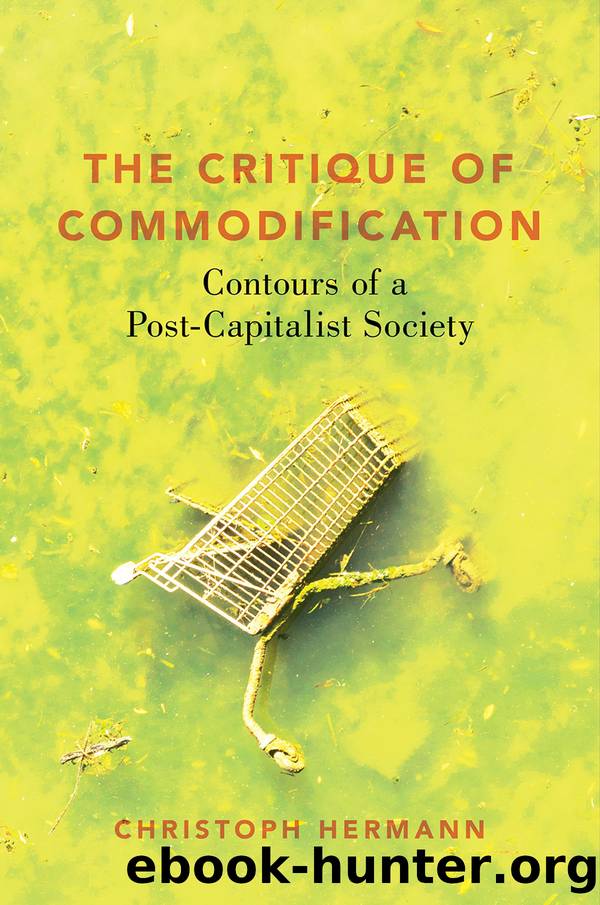The Critique of Commodification by Christoph Hermann;

Author:Christoph Hermann;
Language: eng
Format: epub
Publisher: OUP Premium
Published: 2021-06-15T00:00:00+00:00
Ecological limits
The ecological boundaries of commodification are also systemic in the sense that they present barriers to capitalist accumulation, but their specific nature and growing importance warrant special treatment. Commodification here is mainly understood as the first step in the process of accumulation, assuming that natural resources that are paid for are deployed in a capitalist accumulation process. The fact that the holders of some resources are paid not to use them does not contradict this assumption. The value of carbon, wetland, and other credits depends on these resources being used up in the accumulation process. There are several barriers that emerge when natural resources become inputs in the accumulation process.
First, there is the finite nature of some natural resources that play a critical role in the capitalist accumulation process. Perhaps the most important non-renewable resource is petroleum. It takes several hundred thousand years to create petroleum from organic material. This means that there will be no additional oil in the foreseeable future when the existing reserves have been depleted. Petroleum is the most important modern source of energy, and as such represents the lifeline of the modern transportation system with its cars, trucks, buses, and airplanes. It is also a critical ingredient in many chemical processes, including the production of fertilizers. The main advantage of petroleum versus other fuels is that comparatively little energy needs to be invested to obtain vast amounts of energy in return (Altvater 2006, 39). In addition, oil and the various petroleum-based fuels can relatively easily be shipped, stored, and distributed to the final consumer.13 As such, oil has proven an extraordinary useful ingredient in the capitalist accumulation process. Elmar Altvater (2006, 54) therefore calls the growth model that emerged in the 1920s and was consolidated after the Second World War âfossil fuel capitalismâ (the importance of oil for the advanced capitalist economies can also be seen in the enduring conflicts over the control of oil, especially in the oil-rich countries of the Middle East).
US petroleum consumption increased by three times between 1950 and 2013 (Ratner and Glover 2014, 8). In 2017, the United States consumed a total of 7.26 billion barrels of petroleum products, or about 19.88 million barrels per day.14 However, with accelerating oil consumption, the amount of remaining reserves has shrunk. Marion King Hubbert (1962) has predicted that there will be a point in time when the total amount of known oil reserves starts to decline. The invention of new extraction methods such as hydraulic fracturing and the exploitation of unconventional sources such as tar sands have proven initial predictions too pessimistic, and peak oil production has been pushed further into the future. This does not, however, mean that oil reserves are infinite. Furthermore, petroleum is not the only natural resource whose quantity is limited. A number of minerals used in the production of high-tech goods such as smart phones are close to or beyond their peak points (Diederen 2009). Given the growing scarcity of non-renewable resources, alongside the lack of fertile
Download
This site does not store any files on its server. We only index and link to content provided by other sites. Please contact the content providers to delete copyright contents if any and email us, we'll remove relevant links or contents immediately.
HBRâs 10 Must Reads for Executive Teams (with bonus article âLeadership That Gets Resultsâ by Daniel Goleman) (for True Epub) by Harvard Business Review(469)
Python for Finance Cookbook by Lewinson Eryk;(439)
Empowering Public Speaking by Deanna L. Fasset & Keith Nainby(405)
Doing business with Japan : successful strategies for intercultural communication by Kazuo Nishiyama(389)
Global Orders and Civilizations : Perspectives from History, Philosophy and International Relations by Sadik Unay; Muzaffer Senel(320)
Engaging with Ethics in International Criminological Research by Michael Adorjan Rose Ricciardelli(279)
The Future Internet by Bernard Marr(255)
Intentional Power: The 6 Essential Leadership Skills For Triple Bottom Line Impact by Lisen Stromberg & JeanAnn Nichols & Corey Jones(255)
Analysis of Financial Statements by Frank J. Fabozzi & Frank J. Fabozzi(254)
The Economics of Banking by Jin Cao(246)
The Three Skills of Top Trading by Hank Pruden(246)
Entrepreneurial Marketing by unknow(239)
The Oxford Handbook of Banking and Financial History by Youssef Cassis;Richard S. Grossman;Catherine R. Schenk;(231)
Focus on Teaching by Jim Knight(230)
Data Science and Analytics for SMEs: Consulting, Tools, Practical Use Cases by Afolabi Ibukun Tolulope(215)
Building a Career in Cybersecurity: The Strategy and Skills You Need to Succeed by Yuri Diogenes(215)
Financial Statement Analysis by Martin S. Fridson;Fernando Alvarez; & Fernando Alvarez(214)
New India by Arvind Panagariya(213)
Maximum Success with LinkedIn by Dan Sherman(189)
